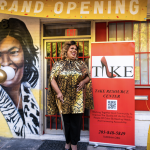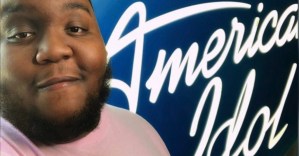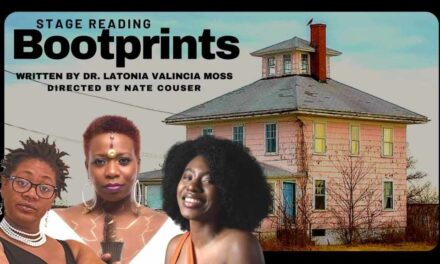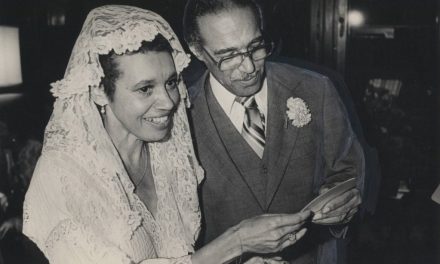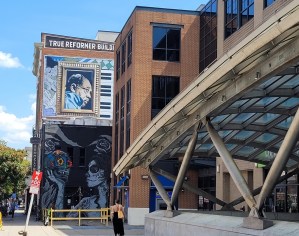By Nicole S. Daniel
The Birmingham Times
Daroneshia Duncan-Boyd knew she always had what it would take to run an organization to help others.
The founder and executive director of Transgender Advocate Knowledgeable and Empowering (TAKE) has been busy lately. In April, she was crowned Ms. Central Alabama Pride. A few weeks later, she hosted a ribbon cutting for the group’s headquarters on the east side of Birmingham.
That same weekend, she ran TAKE’s Sixth Annual Community Awards Gala at the Tuxedo Ballroom in Ensley. And on Tuesday, she was in Montgomery as the Alabama LGBTQ Action Group rallied to demand equal rights for all Alabamians.
The LGBTQ+ community and their allies say Alabama legislators are attacking the state’s transgender community in sports, education, training, public conversations, and spaces; and now through Drag Bans “as a means to criminalize freedom of expression.” House Bill 401, which seeks to ban drag performances throughout the state, was recently introduced in the Legislature.
“I think it’s ludicrous that they are coming up with something like that and using children in a way to ban drag entertainment,” said Duncan-Boyd. “It’s someone’s livelihood, a way for them to make money. If that’s the case, you need to ban ‘RuPaul’s Drag Race’ from television because kids have access to television, laptop computers, and all that stuff.”
Taking Off
Duncan-Boyd said she was inspired to launch TAKE in 2013 because it was “simple.”
“I was really trying to change and get out of my mess. Being a former sex worker, surviving substance abuse, mental health, chronic homelessness—you name it, I went through all of that,” she said. “I was able to come up with this brilliant idea to make a difference for my community. … Ten years later, we continue to thrive, do the life-changing work, and make a difference.”
TAKE was launched a decade ago as a small peer-support group that would meet twice a week for outdoor activities like picnics, during which the group would hand out toiletries, food, and condoms to sex workers, while building a community and networking with one another.
With the ribbon-cutting in April, the organization now has a facility that will serve as a resource center—a one-stop shop to provide holistic services that include a support and network group called Black Knights that serves Black and Brown transgender individuals across the South.
“Destined to Be”
Duncan-Boyd grew up in Birmingham’s Norwood community in a two-parent household with four other siblings. At the age of 12, she moved with her parents to Loveman Village on the west side of Birmingham and attended A.H. Parker High School.
At 17, before she graduated in 2001, Duncan-Boyd’s stepfather co-signed for her to move into an apartment.
“I barely made it my last year in high school,” she said. “While I had good grades, I felt like my life was turning around. I knew I was destined to be this woman. I didn’t know what it would be like or how it would happen, but I knew it would. … Right after high school, I started to transition.”
Duncan-Boyd, 40, who is married to Logan Boyd and legally changed her name to Daroneshia 15 years ago, said she knew long before high school who she was.
“Since five or six years old, I remember dancing around in my mother’s shoes, playing in her makeup, playing around and wrapping myself in sheets. … I would get pillowcases and make my hair. I always played with my sisters’ Barbie dolls. When we played house, I would always play the mama.”
After graduating from high school, Duncan-Boyd attended Lawson State Community College.
“That’s when life began to really happen,” she said. “I withdrew and enrolled at Virginia College, and that’s when I realized I was not about to continue to attend college. I wanted to know what the streets was about.”
Transformation
Duncan-Boyd’s older cousin took her out to a club she described as “fierce and off the chain.”
She met lifelong friends at the club, some of whom are now considered her alternative parents, who at the time she didn’t know was transgender.
After learning these individuals were transgender women, Duncan-Boyd said to herself, “This is it. This is me. This is exactly what I need to do.”
Almost 22 years ago, she learned about an online pharmacy, where she ordered hormonal medications that were shipped to her home to begin the process of transitioning to a woman. She started entertainment and pageants at the age of 18.
From ages 18 to 28, Duncan-Boyd’s life was tormented, she said.
“After a while of getting tired of sex work, I said [to myself], ‘There’s got to be something better. There’s got to be something different.’ I went to search for services throughout the city, and I wasn’t able to get any services or any support.”
A New Beginning
Duncan-Boyd remembered being turned down when she was seeking housing. She didn’t qualify, she said, “[because] I didn’t have any type of documents for chronic [illness] and, of course, I wasn’t HIV positive. If I had been [positive], I would have been able to get housing. To me, that was the wrong message to send out.”
That’s when Boyd began to fight to make sure trans individuals got what they needed. Boyd and her staff are excited that TAKE has transformed into something “greater.”
“We have endured the storm,” she said. “We’re here now, and we’re no longer a silo. … The work that TAKE is doing is not only servicing greater Birmingham, but it’s servicing throughout the state of Alabama. We’re getting so many referrals and stuff, and this is a service that’s being offered to the citizens who deserve to live and thrive in Alabama.”
Through it all, Duncan-Boyd has remained who she’s always been—and, of course, she was not surprised to win the Ms. Central Alabama Pride beauty pageant.
“I had to make sure I still had it. My poise on the stage, my modeling abilities, and being able to chat and have the intellect to hold an interview is what got me the title I have,” she said.
In other words, she still has what it TAKEs, she said.

